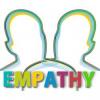CYBERMED LIFE - ORGANIC & NATURAL LIVING
CYBERMED LIFE - ORGANIC & NATURAL LIVING
 Empathy is the capacity to understand or feel what another person is experiencing from within in their frame of reference, i.e., the capacity to place oneself in another's position. There are many definitions for empathy that encompass a broad range of emotional states. Types of empathy include cognitive empathy, emotional empathy, and somatic empathy.
Empathy is the capacity to understand or feel what another person is experiencing from within in their frame of reference, i.e., the capacity to place oneself in another's position. There are many definitions for empathy that encompass a broad range of emotional states. Types of empathy include cognitive empathy, emotional empathy, and somatic empathy.
The English word empathy is derived from the Ancient Greek word εμπάθεια (empatheia, meaning "physical affection or passion"). This, in turn, comes from εν (en, "in, at") and πάθος (pathos, "passion" or "suffering"). The term was adapted by Hermann Lotze and Robert Vischer to create the German word Einfühlung ("feeling into"), which was translated by Edward B. Titchener into the English term empathy.
Alexithymia is a word used to describe a deficiency in understanding, processing or describing emotions in oneself as opposed to in others. This term comes from the combination of two Ancient Greek words: ἀλέξω (alekso, meaning "push away, repel, or protect") and θυμός (thymos, meaning "the soul, as the seat of emotion, feeling and thought"). Thus alexithymia literally means "pushing away your emotions".
Empathy has many definitions that encompass a broad range of emotional states, including caring for other people and having a desire to help them; experiencing emotions that match another person's emotions; discerning what another person is thinking or feeling; and making less distinct the differences between the self and the other. It can also be understood as having the separateness of defining oneself and another blur.
It also is the ability to feel and share another person's emotions. Some believe that empathy involves the ability to match another's emotions, while others believe that empathy involves being tenderhearted toward another person.
Having empathy can include having the understanding that there are many factors that go into decision making and cognitive thought processes. Past experiences have an influence on the decision making of today. Understanding this allows a person to have empathy for individuals who sometimes make illogical decisions to a problem that most individuals would respond with an obvious response. Broken homes, childhood trauma, lack of parenting and many others factors can influence the connections in the brain which a person uses to make decisions in the future.
Martin Hoffman is a psychologist who studied the development of empathy. According to Hoffman everyone is born with the capability of feeling empathy.
Compassion and sympathy are terms associated with empathy. Definitions vary, contributing to the challenge of defining empathy. Compassion is often defined as an emotion we feel when others are in need, which motivates us to help them. Sympathy is a feeling of care and understanding for someone in need. Some include in sympathy an empathic concern, a feeling of concern for another, in which some scholars include the wish to see them better off or happier.
Empathy is distinct also from pity and emotional contagion. Pity is feeling that another is in trouble and in need of help as they cannot fix their problems themselves, often described as "feeling sorry" for someone. Emotional contagion is when a person (especially an infant or a member of a mob) imitatively "catches" the emotions that others are showing without necessarily recognizing this is happening.
Since empathy involves understanding the emotional states of other people, the way it is characterized is derived from the way emotions themselves are characterized. If, for example, emotions are taken to be centrally characterized by bodily feelings, then grasping the bodily feelings of another will be central to empathy. On the other hand, if emotions are more centrally characterized by a combination of beliefs and desires, then grasping these beliefs and desires will be more essential to empathy. The ability to imagine oneself as another person is a sophisticated imaginative process. However, the basic capacity to recognize emotions is probably innate and may be achieved unconsciously. Yet it can be trained and achieved with various degrees of intensity or accuracy.
Empathy necessarily has a "more or less" quality. The paradigm case of an empathic interaction, however, involves a person communicating an accurate recognition of the significance of another person's ongoing intentional actions, associated emotional states, and personal characteristics in a manner that the recognized person can tolerate. Recognitions that are both accurate and tolerable are central features of empathy.
The human capacity to recognize the bodily feelings of another is related to one's imitative capacities, and seems to be grounded in an innate capacity to associate the bodily movements and facial expressions one sees in another with the proprioceptive feelings of producing those corresponding movements or expressions oneself. Humans seem to make the same immediate connection between the tone of voice and other vocal expressions and inner feeling.
In the field of positive psychology, empathy has also been compared with altruism and egotism. Altruism is behavior that is aimed at benefitting another person, while egotism is a behavior that is acted out for personal gain. Sometimes, when someone is feeling empathetic towards another person, acts of altruism occur. However, many question whether or not these acts of altruism are motivated by egotistical gains. According to positive psychologists, people can be adequately moved by their empathies to be altruistic.